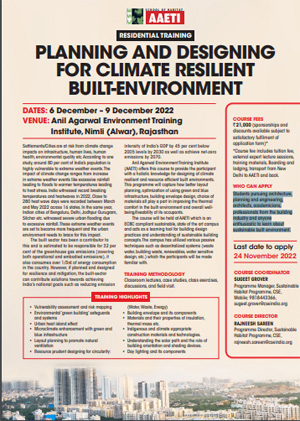Residential Training: Planning and Designing for climate resilient built environment
Dates: December 6 - 9, 2022
Last date to apply: November 24, 2022
VENUE: Anil Agarwal Environment Training Institute, Nimli (Alwar), Rajasthan
Settlements are at risk from climate change impacts on infrastructure, human lives, human health, environmental quality etc. According to one study, around 80 per cent of India’s population is highly vulnerable to extreme weather events. The impact of climate change ranges from increase in extreme weather events like excessive rainfall leading to floods to warmer temperatures leading to heat stress. India witnessed record breaking temperatures and heatwaves in 2022, Close to 280 heat wave days were recorded between March and May 2022 across 16 states. In the same year, Indian cities of Bengaluru, Delhi, Jodhpur Gurugram, Silchar etc. witnessed severe urban flooding due to excessive rainfall. These extreme weather events are set to become more frequent and the urban environment needs to brace for this impact.
The built sector has been a contributor to this and is estimated to be responsible for 32 per cent of the greenhouse gas emissions (covering both operational and embodied emissions), it also consumes over 1/3rd of energy consumption in the country. However, if planned and designed for resilience and mitigation, the built-sector can contribute solutions towards achieving India’s national goals such as reducing emission intensity of India’s GDP by 45 per cent below 2005 levels by 2030 as well as achieve net-zero emissions by 2070.
Anil Agarwal Environment Training Institute (AAETI) offers this course to provide the participant with a holistic knowledge for designing of climate resilient and resource efficient built environments. This programme will capture how better layout planning, optimization of using green and blue infrastructure, building envelope design, choice of materials all play a part in improving the thermal comfort in the built environment and overall well-being/liveability of its occupants.
The course will be held at AAETI which is an ECBC compliant sustainable, state of the art campus and acts as a learning tool for building design practices and understanding of sustainable building concepts. The campus has utilized various passive techniques such as decentralized systems (waste water, building waste, renewables, water sensitive design, etc.) which the participants will be made familiar with.
SALIENT FEATURES OF THE TRAINING COURSE:
- Vulnerability assessment and risk mapping
- Environmental ‘green building’ safeguards and systems
- Urban heat island effect
- Microclimate enhancement with green and blue infrastructure
- Layout planning to promote natural ventilation
- Resource prudent designing for circularity: (Water, Waste, Energy)
- Building envelope and its components
- Materials and their properties of insulation, thermal mass etc.
- Indigenous and climate appropriate construction materials and technologies.
- Understanding the solar path and the role of building orientation and shading devices.
- Day lighting and its components
- Energy conservation building code
Course Coordinator:
Sugeet Grover
Programme Manager,
Sustainable Habitat Programme, CSE,
9818443366
sugeet.grover@cseindia.org
Course Director:
Rajneesh Sareen
Programme Director
Sustainable Habitat Programme, CSE,
rajneesh.sareen@cseindia.org
| Flyer | |
 |
|
| Download Flyer | |
| WHO CAN APPLY | |
| Students pursuing architecture, planning and engineering, architects, academicians, professionals from the building industry and anyone enthusiastic to learn about sustainable built environment. | |
| COURSE FEES | |
| Rs 24,000 (sponsorships and discounts available subject to satisfactory fulfilment of application form) * Course fee includes tuition fee, external expert lecture sessions, training materials, Boarding and lodging, Transport from New Delhi to AAETI and back. |

Share this article